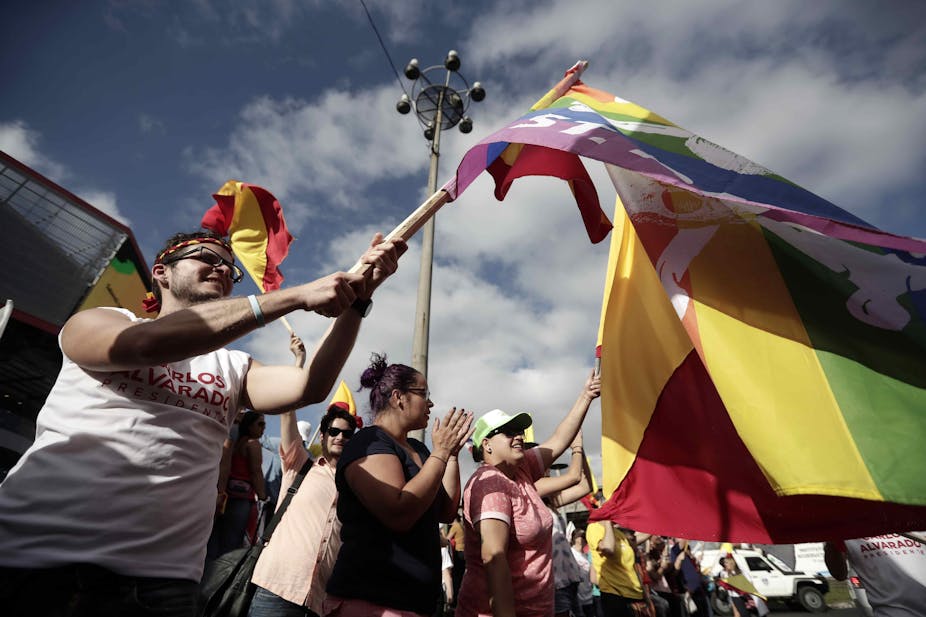Three days after Costa Rica’s 2018 elections, the Supreme Elections Tribunal main building in San Jose was showered with flowers and grateful messages. “Thank you for the incredible work!”, read one. Another carried a drawing of crayons with a caption reading “our bullets” – a reference to the crayons Costa Ricans use to mark their ballots.
At the time, Costa Rica had just elected Carlos Alvarado as its new president. And at 38, he is the youngest head of state in modern Costa Rican history; he is supported by vice-president Epsy Campbell, the first woman of African descent to hold such a post anywhere in continental America. But they will have a steep hill to climb as they try to form a government: in the Legislative Assembly, Alvarado’s Citizens’ Action Party (PAC) counts only ten of the 57 members of congress.
This tough political calculus fits a pessimistic narrative that set in weeks long before Alvarado won the vote on April 2. Despite the groundbreaking nature of his candidacy and victory, international and local media has largely portrayed the election as bitterly divisive, some arguing that it fit a global trend towards increasingly polarised and irreconcilable politics. But this isn’t the whole story.
The elections produced a remarkable renewal of pride in the country’s longstanding democratic processes. The flowers and messages left at the tribunal building convey the deep respect and trust Costa Ricans have for their primary electoral institution, which ranks fifth in the world on electoral credibility and efficiency. Yet outside the country, little has been told so far about how the elections helped restore this respect and trust – and the extent to which Costa Ricans themselves took the initiative to preserve the health of their precious democracy.
Right after the election’s inconclusive first round, all sorts of grassroots movements and initiatives started to crop up. One was an online movement called Adopt a Deputy, which tried to organise citizens to be “responsible” for particular deputies in the Legislative Assembly, to follow up on their performance and to promote different agendas. But an even larger initiative came in the form of a Facebook group called Coalición Costa Rica.
Pulling together
The group was created the day after the first round of elections in February. Within 48 hours, it grew to nearly 230,000 members; by the time of the second round, it had more than 275,000. Its page describes it this way: “This space is created in order to identify mutual problems, to create dialogue and to suggest concrete and feasible proposals.”
The group counts members from different political parties, and many who don’t identify with any particular party. They were united in opposition to the other leading candidate, Fabricio Alvarado Muñoz – specifically his stances on human rights, such as his opposition to gay marriage and his willingness to withdraw the country from the Inter-American Court of Human Rights. Consequently, one of the group’s main objectives was to mobilise as many people as possible to vote for Carlos Alvarado instead.

Many people used the groups to encourage others to vote, but others went further and actually offered hospitality, opening their houses to fellow Costa Ricans who don’t live near a voting centre. The distance from the voting centres prevented many people from voting in the first round, especially those abroad. While it is possible to vote from overseas, in most countries, the only place to do so is at a Costa Rican embassy, or sometimes at a consulate. The group’s efforts meant voters all over the world, from the UK and Ireland to Germany and beyond, found places to stay while they travelled to cast their ballots.
Days prior the elections, members of the group proposed different strategies to increase the votes. The group was filled with posts such as “let’s convince one member of our family each” encouraging others. Many of these tactics worked as users flooded Facebook with pictures of their loved ones after voting, adding captions like “this is my grandma, I convinced her to vote”.
National unity wins
On another heartening front, in the second round, turnout was 10% higher than in the first round. This bucks a trend set by the last two elections, where the second round drew fewer voters than the first. Ottón Solís, founder of the Citizen Action Party (PAC), took heart on this uncommon electoral behaviour: “Even though we won this second round, the great winner here is Costa Rica. Democracy won.”
Ottón’s message seems to resonate with Carlos Alvarado’s plan to form a National Unity Government, one that will assemble a more democratic cabinet by including all parties represented in the Legislative Assembly. This is unprecedented in modern Costa Rican politics. That it’s happened reflects not just the divided makeup of the Legislative Assembly, but the the two finalists’ anaemic performance in the first round of the election. Speaking on TV, Ottón Solis put it this way: “The country gave [the PAC] 20% in the first round and gave Fabricio 24%. I think that the message from the people was talk to each other.”
These efforts towards unity in the country reflect an integral part of the Costa Rican national imagination: this is a country that celebrates democracy and peace. In this year’s election, division almost became the new narrative – but in the end, these deeper values won the day.

